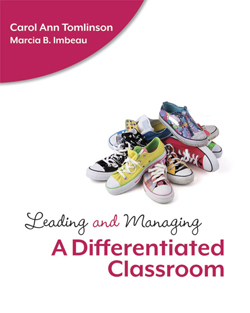Marcia Imbeau, a University of Arkansas associate professor of special education, collaborated with Carol Ann Tomlinson, a top authority on differentiated instruction, to co-author a new book, Leading and Managing a Differentiated Classroom, published by ASCD.
Differentiated instruction addresses the great variety of learners and the great diversity of these students' needs that teachers see in their classrooms today. The Tomlinson and Imbeau book goes beyond traditional classroom management techniques to incorporate differentiated instruction principles, explaining for teachers how to lead a class that is differentiated to individual students' needs. It covers time, space, materials, groups and strategies in ways that balance content requirements with multiple pathways for learning.
"I believe the book provides new and experienced teachers with important information and practical suggestions for thinking about the classroom so that meeting the needs of diverse learners is a successful endeavor for teachers and their students," Imbeau said.
In the first half of the book, the authors provide information to enable readers to be more confident and effective leaders in student-focused, responsive classrooms. The second half gives teachers the tools they need to translate a dynamic curriculum and differentiation plan into classroom practices. The book emphasizes that teachers who are uncomfortable with flexible classroom management will not differentiate instruction, even if they understand it, accept the need for it and can plan for it.
It includes step-by-step guidelines, checklists and a Teacher's Toolkit with classroom activities.
Tomlinson, who teaches at the University of Virginia, and Imbeau argue that the inherent interdependence of leading and managing a differentiated classroom is at the heart of 21st-century education.
"The topic of differentiation has been a focus of my work my entire teaching career and has played a large role in my work in the Master of Arts in Teaching childhood education program and the gifted and talented education program," Imbeau said. "It is my belief that teachers have always had a variety of learners in their classes and have always known that they had a responsibility to meet those varied learning needs. The challenge for teachers is figuring out how to do that in an effective, reasonable way that promotes growth in all students."
Imbeau teaches graduate courses in childhood education and gifted education. She is actively involved in university and public school partnerships, working regularly with her interns and their mentor teachers as a university liaison and teaching courses in curriculum development, differentiation, classroom management and action research.
She has served as a board member and member of the executive committee of the National Association for Gifted Children and of the Council for Exceptional Children's division on gifted education. She has also served as the president of Arkansans for Gifted and Talented Education, a state organization that supports appropriate services for all students.
Contacts
Heidi Wells, director of communications
College of Education and Health Professions
479-575-3138,
